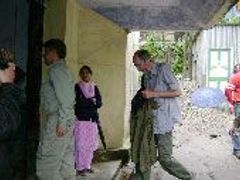Interview - Czech researchers have for the first time acknowledged that they were not aware of all the regulations restricting the collection of insects before their trip to India.
"In India, you can step on a bug, but you can't collect them. Unfortunately, we didn't know that," explained entomologists Petr Švácha and Emil Kučera, who were imprisoned by Indian authorities on June 22 for illegal gathering insects.
Finally, after more than a month in prison, the biologists were released on bail on July 25. They are now awaiting charges before their trial begins. According to local laws, they could receive prison sentences of three to seven years.
The movement of the scientists has been restricted to Darjeeling, where they must check in with the local authorities twice a week.
The Czech scientists have been accused of entering a national park without a permit and bug collecting on its territory. "We are convinced that we were not in a national park, but we haven't yet been able to obtain a map," explained one of the entomologists in an email interview with Aktuálně.cz.
A.cz: What exactly have you been accused of?
We have been accused of entering a national park and collecting bugs in it, according to articles 27 and 29 of the Wildlife Protection Act.
A.cz: You maintain that you were not on park land.
We never saw any signs indicating the boundaries of the park and we traveled on the paths used by locals and tourists, moreover in areas that are obviously economically developed - pasture land, timber forests, burned areas, etc. That is prohibited in a national park. We are therefore convinced that we were not in a national part (otherwise it would be a secret trap for tourists), but we have not yet been able to get a map.
A.cz: What were you collecting?
Insects and their larvae, moths, a small number of other smaller insects. We also collect for some colleagues if they request something special.
A.cz: What was the value of the species you were collecting?
The value of an insect is problematic. Our material was certainly for non-commercial purposes and was only valuable to a specialist. As far as we know, there wasn't a single protected species in our material. But even for us the classification of Indian material in the field is often impossible and it must be given to a specialist.
Švácha: The larvae that we collected for ourselves for example currently isn't studied by anyone else on the planet, and for that reason it is valuable only to me.
A.cz: And you collected the insects for what purpose?
As I have already mentioned, [the collection] is (or rather was, unfortunately) intended for scientific purposes and was not commercial. We would like to clarify to readers that neither one of us was smuggling bugs into China for thousands of dollars to be used in traditional Chinese medicine, as we sometimes ready about ourselves.
A.cz: Is there any prospect of getting the confiscated bugs back?
Because we will be somehow punished whatever the case, we fear that it will already be too difficult to recover the bugs, but we will try. It cost us a lot of hard work in the rain, among leeches and [the collection] contains very valuable material for us.
A.cz: In your view, is the indictment logical?
Everything has two sides. The collection of incidental insects definitely doesn't threaten the biodiversity, similar affairs are completely nonsensical. From a legal point of view, it depends on what can be done in a given country and whether someone has an interest in it. Here for example, interest on the part of the foresters for a big case and publicity was evident.
A.cz: What needs to be done to get permission to collect insects in India?
As far as we know, it is made formally on the basis of whether research for a given country is needed. In reality however, the procurement of such permits (and not only in India) is not very probable. Everything is up to the officials, and even Indian biologists and etymologists are themselves frustrated by restrictions that basically prevent them from working or educating students.
A.cz: Did you not apply for them out of ignorance?
We tried to keep away from protected areas. Unfortunately, we were not aware of the complete restriction on the collection of anything whatsoever. You can easily step on an insect that has flow toward a light in the city, but you can't collect it.
After being let out on bail
A.cz: What law states that it isn't possible to collect anything?
We are not sure about that. Indian colleagues cite two laws that do not allow them to carry out research in their country, and they have been fighting for two years already.
A.cz: What is the justification for the existence of such regulations?
Generally the situation is thus: Legislation regarding the protection of the environment must be established in such a way that it applies to large vertebrates. The shooting of a tiger can have a significant influence on a weaker population. However, nothing will happen if one collects ten samples of an insect species, of which there are thousands living on the same territory as one tiger. By applying such a regulation to the collection of bugs, it becomes a kangaroo court.
A.cz: The conservation of insects then isn't in place?
Not even commercial collectors can seriously influence insect biodiversity, if they do not destroy the biotope at same time. And to do that they would have to come with a big truck and several chainsaws. Not to mention what regularly goes on in the forests of India or Madagascar. The conservation of insects on an individual basis doesn't, with negligible exceptions, serve any purpose.
This is the first part of an expanded interview with entomologists Petr Švácha and Emil Kučera, who are now being held in India. In part 2, you will learn about the scientists' stay in the Indian prison and their cooperation with Indian lawyers.

